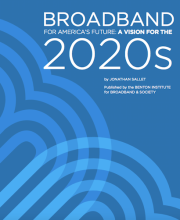Broadband for America’s Future: A Vision for the 2020s

The Benton Institute for Broadband & Society has a reputation for looking at today’s reality with an eye toward tomorrow’s needs. In their report, Broadband for America’s Future: A Vision for the 2020s, Benton Senior Fellow Johnathan Sallet continues that perspective and offers insightful recommendations for a new National Broadband Agenda.
Download the report, Broadband for America’s Future: A Vision for the 2020s here.
Broadband for All Needs a New Approach
As access to high-quality connectivity becomes more critical each day, those without fast, affordable, reliable Internet access lose ground more quickly as time passes. In addition to the opportunities that come with broadband access, lack of adoption translates into lack of technical skills. Innovation isn’t slowing down for folks who don’t have broadband.
As Sallet notes, access to and adoption of broadband improves our economy, strengthens communities, and empowers American workers. Obtaining that access and expanding that adoption, however, is proving more challenging than it should be.
In his report, the author reviews in detail the barriers that have prevented the U.S. from achieving its goal of ubiquitous access and adoption of broadband. He’s able to make recommendations based on four key policy areas:
Deployment of networks where adequate broadband does not exist;
Competition to increase choices and spur lower prices and better-quality service to their residents;
Affordability and Adoption for those who wish to have broadband in their homes but lack the means or the skills to acquire it; and
Community Anchor Institutions, such as schools and libraries, that increasingly serve their users wherever they are.
"The Same Fabric of Truth-Seeking"


